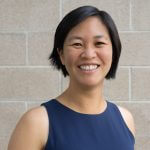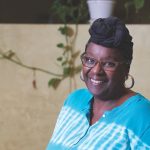Juliana Gonzalez
Richmond, California
Juliana Gonzalez, Executive Director of The Watershed Project, is a watershed planning and policy expert. She holds a Ph.D. in Geography from Kings College London and an M.S. in Environmental Sciences from the State University of New York. Juliana started her career in the environmental field in her home country of Colombia, where she worked for the Colombian National Planning Department as a Natural Resource Planner and Policy Development Coordinator. After immigrating to the United States over 20 years ago, Juliana used her policy and ecology background to work on community-based solutions to ecological problems prevalent in urban environments. For the last decade, she has led the way in multiple community-based climate adaptation and mitigation restoration and planning efforts around Richmond California, and the neighboring communities. Juliana has been an active community organizer in Richmond since 2008, connecting communities, volunteers and students to their local watersheds through education, restoration, and design projects. Known for her local knowledge of the area, she became Executive Director of The Watershed Project in 2014.
This interview was conducted by Carly Schmidt on January 15, 2019. Learn more about Juliana’s work at The Watershed Project.
Did you grow up around water? Where? What are your fondest early memories of rivers, lakes, or streams?
I am from Colombia. I grew up in Bogota, which is the capitol of Colombia and a really big city. From an early age I was interested in mountaineering. I was up in the highlands of Colombia, similar to the high meadows in California. We have wetlands called Páramos, which have fantastic flowers that grow very slowly. I was fascinated by the ecosystem. I visited about 50 of those before I graduated from high school.
When did you first realize that you wanted to help save rivers or stand up for healthy rivers and/or clean water?
I was more interested in protecting wetland ecosystems because, in Bogota, that was where water for the city came from. Near my university there were beautiful places where we could explore. During college I started trying to understand ways to protect wetlands, or Páramos, including studying biology with a focus on wetland ecology. Colombia is a wet country, but it is such a fragile ecosystem because there is no reservoir like there is in California.
Why is protecting rivers and water important to you now?
Water is a human right, but we do not often think about ways to protect the resource in a holistic way. We take water for granted because it comes out of our taps. Then you have an emergency like a flood and water awareness increases for a short while. When I arrived in California, I wanted to work at the intersection of public awareness and organizing protection. This is what I do now: I work to connect communities at the grassroots level.
What water-related accomplishment are you most proud of?
I am most proud of having been part of a grassroots movement that resulted in real improvements to the landscape. Here at the Watershed Project, we work with municipalities on capital improvement projects that restore the ecosystem and educate the public. We have completed more than 12 projects with the city and many miles of public infrastructure have been made green. I am very proud of our collective effort on those projects.
We recently began work with school districts to bring green schoolyards to San Francisco and Oakland. We just completed our first green schoolyard in Oakland and have 5 more planned in the next few years. We hope that this breakthrough with the school district will prioritize urban greening not only because it is beautiful but also because it will serve as an outdoor classroom and a model for other schools.
What does being a part of River Network mean to you?
When we attended River Rally in California, we were surprised to hear about other people’s work in urban settings. There were a lot of interesting conversations about equity and inclusion surrounding ‘urban waters’ organizations. The Watershed Project is an ‘urban waters’ group as well, and it was important for us to learn from others and understand that we also have something to contribute. We have years of experience at the Watershed Project, and in learning that there are so many other groups working in green infrastructure, we feel that we have important knowledge to share with the group. There is a lot for us to learn from similar organizations, but we also have a lot to share.
What positive changes would you like to see for water in your community over the next 10 years?
Aside from more awareness from policymakers concerning the benefits of investing in green infrastructure, I would like to see a more permanent source of funding that will allow projects to become core capital improvement projects. Hand-in-hand with this is maintenance. These projects benefit the well-being of citizens and can also create jobs for citizens living in these communities, but in order to reap the benefits, green infrastructure and maintenance need to be line items in the municipal budget.







